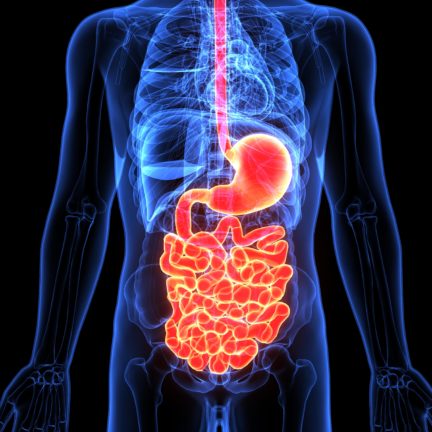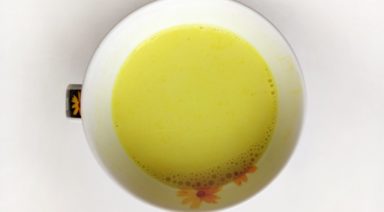Ancient Medicine Berberine Could Help with Leaky Gut Syndrome

Many call it “leaky gut.” Researchers and health practitioners call it “increased intestinal permeability,” “dysbiosis,” or “hyperpermeable intestine,” but no matter how you name it, leaky gut syndrome could be the jumping-off point for a huge range of “first-world” diseases. Leaky gut syndrome could be responsible for eczema and psoriasis, autoimmune diseases including multiple sclerosis and rheumatoid arthritis, acne, irritable bowel syndrome, and Crohn’s disease to name a very few.
Symptoms of leaky gut include diverse complaints including acne, cramps, gas, bloating, allergies, joint pain, brain fog, memory loss, or fatigue. Taken alone, any one of these symptoms may indicate a number of conditions, but when they show up in combination, and the root cause cannot be determined, it might pay off to explore leaky gut syndrome. Trying to treat symptoms when the underlying cause is leaky gut can be frustratingly unsuccessful.
There’s a way out, and research is showing that along with dietary changes and probiotics, recovery can be significantly potentiated with berberine, an ancient plant medicine.
Leaky Gut 101
Leaky gut occurs when the healthy intestinal biome, or bacterial environment, becomes compromised, and the gut’s membrane walls weaken. There is some degree of inflammation in the gut when this happens. Undigested food particles are able to breach the gut wall, becoming toxic when entering the bloodstream. Yeast and unfriendly bacteria also travel into the blood, potentially affecting every system within the body.
These toxins provoke inflammation — both generalized and local — and an insidious cycle begins when leaky gut produces inflammation that in turn produces more leaky gut.
When the body detects toxins entering the bloodstream, it begins to fight them through the body’s chemistry lab, the liver. Quickly, the liver becomes overloaded trying to break down toxic chemicals, and the immune system shifts into attack mode. If the immune system is constantly triggered to be “on,” struggling to deal with an unending stream of toxicity, an autoimmune, or “friendly fire” response may be provoked.
This mechanism has been linked to autoimmune diseases such as Lupus, Multiple Sclerosis, and Crohn’s disease — in 2000, autoimmune disease in one form or another was established as the leading cause of death in young and middle-aged women.
Causes of Leaky Gut
Diets heavy with processed foods, refined carbohydrates, sugars, and vegetable oils along with a low fiber diet set the environment for leaky, or permeable gut. According to one study, “Leaky Gut as a Danger Signal for Autoimmune Diseases,” “Nutrients and food ingredients have been reported to contribute to the maintenance or alterations of gut microbiota and the intestinal barrier function.” Within scientific and medical communities, leaky gut syndrome has been hotly debated; the Gastrointestinal Society of Canada has taken the position that there is not enough research to confirm the leaky gut theory, while the NEJM Journal Watch states that “Leaky gut is real, and might contribute to disease.”
A lack of whole, plant-based foods may contribute to an unhealthy gut biome, and lack of healthy fermented foods such as yogurt with live probiotic cultures make it worse. Stress, the hallmark of first-world societies, stacks the deck in favor of leaky gut — cortisol, the stress hormone, erodes the gut walls. Anti-inflammatory drugs, NSAIDS, and aspirin all contribute to compromised gut health as well as yeast bacteria overgrowth created by sugars in the diet.
Radiation and chemotherapies and antibiotics strip the gut of healthy bacteria, throwing the microbiome into a tailspin. Moderate exercise may improve the gut, but research shows that excessive, strenuous exercise promotes gut imbalances, as well as anything that produces free radicals such as smoking, alcohol, and allergens.
It would be a mistake to imagine that all of these causes would be required for a leaky gut condition to develop — a few of them in combination, such as stress + anti-inflammatories, antibiotic drugs + sugar + absence of healthy probiotic bacteria, etc. could trigger a leaky gut.
Conditions Associated with Leaky Gut Syndrome
A short-list includes; allergies and food sensitivities, headaches, brain fog, memory loss, eczema or psoriasis, acne, depression, diarrhea and constipation and bloating. Many researchers theorize that leaky gut also leads to serious health challenges such as irritable bowel and colitis, Crohn’s disease, autoimmune diseases, liver and gallbladder inflammation and disease, celiac disease, chronic fatigue syndrome, and fibromyalgia.
Gut imbalances can contribute to hormonal imbalances. If that happens, it’s an entire new rabbit hole with things like polycystic ovary syndrome (PCOS), researchers have discovered a relationship between leaky gut and low progesterone levels leading to irritable bowel syndrome (IBS). It has been said that if a patient develops unexplainable symptoms, and no clear diagnosis can be established, it could be that a leaky gut is the underlying cause.
Diagnostic tests can determine whether intestinal permeability, or leaky gut, is present; Genova Diagnostics offers the Intestinal Permeability Assessment. Another is available from BioHealth Laboratory — the Leaky Gut Assessment. The Life Extension website also offers tests. KBMO Diagnostics has designed tests for food sensitivities that may be associated with leaky gut.
Can Leaky Gut Be Treated?
Leaky gut syndrome and symptoms can be drastically reduced when a thriving intestinal “microbiome,” or environment, is established. This means eliminating processed foods such as refined flour, sugar, and vegetable oils, and switching to a diet rich in fiber, including sprouted seeds, root vegetables and leafy greens, healthy fats such as avocado, coconut, and virgin olive oils, lean animal protein, and fruits and berries. Leaky gut dietary recommendations can be researched online by using search terms such as “leaky gut diet.”

Probiotics
Clearly, adding probiotic-rich foods and taking probiotic supplements steps toward a healthy gut. “Current Nutritional Food Science” is a journal that publishes research studies on food and nutrition. In 2013, the journal published a study on reversing leaky gut with probiotics, the friendly bacteria that populate a healthy gut.
Titled “Protection and Restitution of Gut Barrier by Probiotics: Nutritional and Clinical Implications,” the paper explains that several friendly probiotic bacteria strains contribute to restoring healthy gut function, noting fermented foods such as yogurt, kombucha, kefir, sauerkraut, and kimchi as probiotic-rich food sources.
A growing number of studies are showing similar conclusions; this study confirmed the use of probiotics as a treatment modality for gastrointestinal issues (leaky gut). An online exploration of “probiotic research” will return several studies and findings on probiotics and intestinal health — too many to list here.
Berberine: Ancient Medicine for a Modern Gut?
Extracted from plants such as Goldenseal, Oregon Grape, Tree Turmeric, and Barberry, berberine is an alkaloid that has been used for centuries in Chinese and Ayurvedic medicine.
The Chinese treat “damp heat” conditions such as metabolic disorder, related to diabetes in the five element system, with berberine.
Both Chinese and Ayurvedic medicine use berberine in treatments for diarrhea, inflammation, intestinal parasites and microbial invaders, and dysentery. Native American people viewed the barberry bush, a source of berberine, as a sacred medicine with supernatural powers to fend off and treat disease — even staph infection. Common in the Middle East, barberry has been used as a ‘folk medicine; for centuries. The ancients valued the plant for it’s infection fighting properties and effectiveness treating digestive disorders.
Modern research confirms berberine efficacy. One paper explores current berberine research, stating that, “Studies show that BBR [berberine] may be therapeutic in various types of chronic diseases. BBR is noted for molecular mechanisms of action and clinical efficacy and safety in patients with type 2 diabetes, hyperlipidemia, heart diseases, cancers, and inflammation.”
But when it comes to leaky gut syndrome, research on berberine and leaky gut permeability (leaky gut) shows that “berberine reduced the permeability of the gut barrier.” And when combined with probiotic supplementation, clinical trials show that healthy gut bacteria increase in numbers and strength — berberine appears to act as a kind of super-fertilizer for healthy intestinal flora. This is good news for those battling leaky gut because when supported by berberine supplementation, probiotics can establish colonies faster and with greater efficiency. Researchers also believe this activity triggers weight loss, blood sugar regulation, and improved liver function.
Candida fungus, or “yeast,” plays a starring role in leaky gut. Under the right conditions, the fungas can spread quickly, causing nasty problems like thrush, urinary tract pain, sinus infections, skin and joint pain, and fatigue. When the gut and immune system are healthy, candida fungus has a harder time getting a foothold in the body. But when the gut microbiome becomes imbalanced and the immune system becomes compromised, opportunistic candida can spread throughout the skin, nose, mouth, throat, and digestive system — even into the lungs.
In studies, berberine has been shown to weaken candida fungal structures, making them easier to kill. This action aids healthy probiotic bacteria in establishing strong colonies to fight fungal microbes. Some candida mutations have developed resistance to fungal drugs, but berberine has the same action against drug resistant strains.
Sara Gottfried MD is the author of the New York Times bestseller “Younger: A Breakthrough Program to Reset Your Genes, Reverse Aging, and Turn Back the Clock 10 Years”. In her blog, Dr. Gottfried offers advice on how to use berberine supplements as well as optimal dosages.
Dr. Gottfried writes, “For diabetes, 500 mg twice daily for three months is effective. Other studies show a benefit at three times daily. As with most herbs, it’s better to take berberine in multiple doses throughout the day.
“The best dose is what works for you – there’s no such thing as one size fits all. Yet the dose used in many women in the clinical trials that show benefit to blood sugar, microbiome, hot flashes, and cholesterol panels is 500 mg three times per day.” She endorses berberine for a variety of hormone-related conditions, but says that pregnant women should not take berberine.
Dr. Gottfried also recommends time limits when taking berberine. She writes, “It’s recommended that you take berberine for only eight weeks at a time and then take a holiday. Many supplements should be used in this way — pulsed in an eight-week cycle, then off for some length of time such as two to four weeks, then restarted if symptoms aren’t resolved.”
Disclaimer: This article provides general information and discussion about health and related subjects. The words and other content provided in this article, and in any linked materials, are not intended and should not be construed as medical advice.
One Expert Shares His Favorite Herbs and Plants to Heal

If you knew you could easily and effectively enhance your mood, energy levels, and brainpower, what would it take for you to do it?
BulletProof founder and New York Times best-selling author, Dave Asprey knows what’s possible when it comes to making changes to the human body through what he calls ‘biohacking’. This knowledge of ourselves enables us to transform our lives, live longer, slow-down the aging process, increase brain power, and enhance our overall performance.
So how do we do it? The first place to start is by cleaning up your diet, getting plenty of sleep, and managing your stress. We can easily boost the nutrient value of our foods, facilitate a healthy rest, and regulate our cortisol levels – the stress hormone – by using specific plant compounds as medicine. These can come from fruits and vegetables, herbs and spices, or even some of your guilty vices. A cup of coffee, for instance, can enhance your performance and contribute to all the feel-good benefits that cascade as a result.
Plant medicine has been around for centuries and is still widely used in the East. Some of these plants we know and love, like turmeric and mushrooms, are incredibly medicinal when used correctly. Others are newer discoveries, and exploring the science behind their properties and benefits, like polyphenols and adaptogens, is a realm that we have longed to delve deeper into.






































